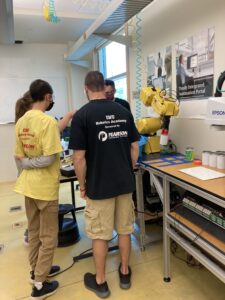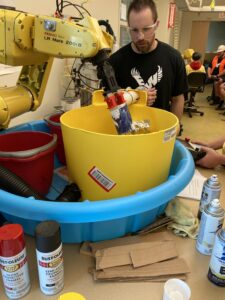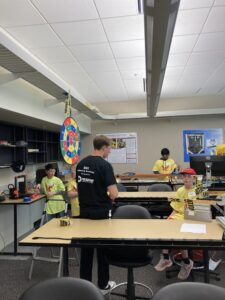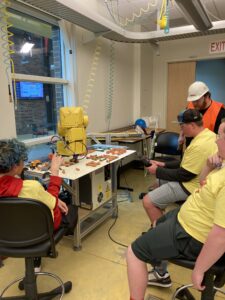EWU Robotics Academy: Learning by Teaching
Eastern Washington’s Robotics Academy is an opportunity for younger local students to get hands-on, personalized robotics training from current Eastern Washington University students. The academy is linked with a course taught by Philip Appel, a lecturer in Eastern’s Mechanical Engineering & Technology Department, who teaches MENG 385 which shows students how to use robotic systems such as Epson and FANUC machines. Due to the nature of the class, Philip’s students engage with the different robots hands-on in order to understand and operate them.
Instead of beginning the course with step-by-step instructions, Philip makes the students attempt to figure out how to operate the robots without any idea about what they’re doing. It’s a “try, fail, teach” method as Philip told me, and only after the students try and fail to operate the robots does he give them the step-by-step instructions on how to use them. Doing this helps students retain the material and gives the directions more meaning and clarity when they are finally provided. Then it’s up to the students to demonstrate their understanding, which includes a lab test where students have to pick up ping pong balls with their machines and then create a lesson plan to teach the local school kids attending the Robotics Academy. The students in Philip’s class start not knowing how to use the machines, but in just a few weeks they gain real world teaching experience sharing their knowledge with local students. After the Academy, Philip’s students have to write papers about how well their teaching worked. Maintaining meaningful, operative goals makes Philip’s class more engaging and effective for his students’ learning.

The Robotics Academy itself begins with a safety discussion where each participant is given safety glasses before heading into lab. The day is divided into four projects: building a house with Lincoln Logs and then destroying it, spray painting cool designs onto white cans that students get to take home, catapulting ping pong balls onto a Velcro dart board, and launching Hot Wheels on a track that gets destroyed and then rebuilt. Each of the projects were designed by the Eastern students running them, as they were encouraged to come up with ideas that would be fun and engaging for the Academy students.

At each stop, the Eastern students demonstrate how to use the machines on their pendants (an electronic tablet controller) while handing out paper instructions to the Academy students before starting them off with simple tasks. The Eastern students teach two types of machines: Epson and FANUC. The Epson were set up with a marker and white board, and the Academy students were shown how to draw different shapes on them using input commands, but the main events were with the FANUC machines, where Academy students operated the robots to pick up different objects, whether wooden blocks, ping pong balls, white cans, or Lincoln Logs.

Once the Eastern students felt like the Academy students had a good grasp on how to operate the robots, they transitioned into more complex tasks. The controls included ‘On-Off’ commands for clasping the objects, as well as arrow key movements to move the robot around. One of the Eastern student’s, Samuel, remarked how making an 86-piece Lincoln Log house took approximately 2,500 lines of code. The kids’ learning isn’t always smooth, at one point one of the 3D printed parts of the spray paint machine broke off and had to be duct-taped, but the learn-as-you-go method is necessary for the students’ learning. At the end of the day, the Academy students are given certificates to showcase their new knowledge.

Samuel, a Mechanical Engineering senior, told me Eastern has one of the few programs that uses hands-on robots for its instruction. In regard to the teaching, he said he was a boy scout and had familiarity with projects similar to Robotics Academy, commenting on how many of those who signed up for the Academy come with at least some background with robotics, making the teaching easier. This was different than Devin, another Mechanical Engineering major, who hadn’t had any teaching experience prior to the Academy. “I like it,” he said, although “hands-on learning is frustrating, the robots don’t always do what you tell them.” All in all, however, he said the experience was “a lot of fun”.
Categories
Experts Directory
Find EWU faculty and staff who are experts in diverse subjects.
